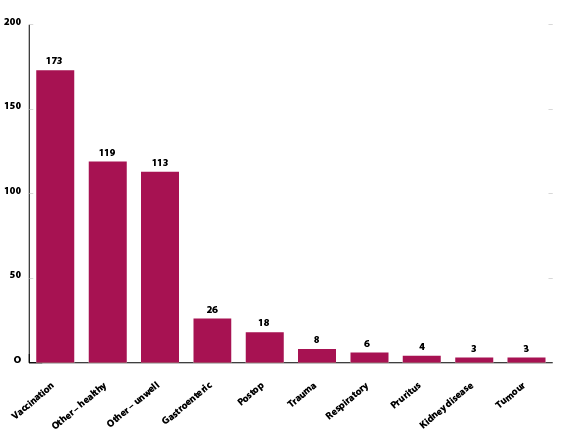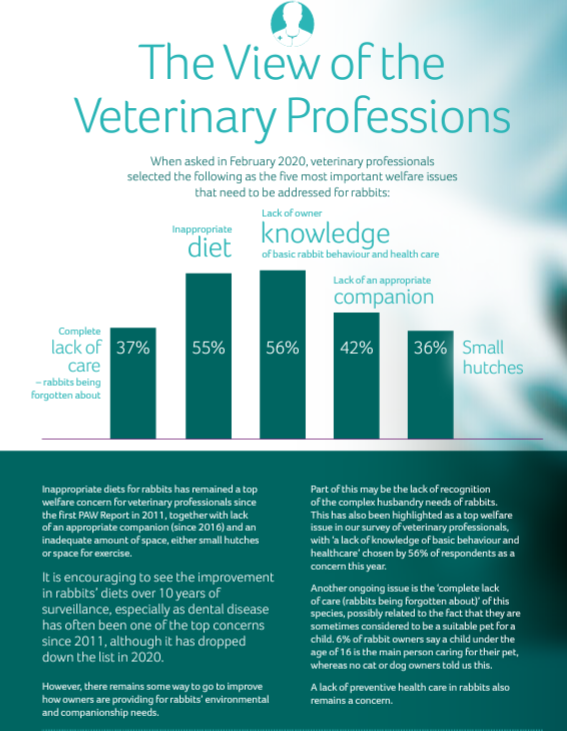23 Aug 2022
Muesli for rabbits – the vets’ (and the rabbits’) perspective

Image © arlee / Adobe Stock
One of the things we “know” is that a muesli-based diet is bad for the long-term health of pet rabbits. This has been described in various studies, but do these studies actually reflect what is seen in the real pet situation as recorded by vets in their consultations?
The aim of this study was to look at just that. In a collaboration between Burgess Pet Care and the Small Animal Veterinary Surveillance Network (SAVSNET), data from 250 veterinary practices over a 7.5-year period (August 2014 to February 2022), was used to form some idea of frequency of muesli feeding and its consequences.
SAVSNET (Panel 1) formed as a collaboration between the BSAVA and the University of Liverpool, and now functions as a university project. SAVSNET collects data from an animal’s electronic health records when it is seen at participating veterinary practices for a consultation.
Electronic health record data is submitted to SAVSNET through a window that appears at the end of a consultation, asking the veterinary surgeon or nurse to choose the main reason for the animal to be brought to the veterinary practice. Some short additional multiple choice questions then follow, which allow for more detailed information to be obtained.
This data is used by researchers to understand the reasons why animals are taken to veterinary practices, how conditions are managed, and to help improve health and welfare of companion animals.
The Small Animal Veterinary Surveillance Network (SAVSNET) is an initiative from the BSAVA and the University of Liverpool. Both share the same passion for companion animal welfare, education and science.
SAVSNET key aims are to:
- monitor disease trends over time and highlight appropriate interventions
- identify populations at risk, and monitor treatments and outcomes
- provide data resources for academics and others
- improve general public awareness of small animal diseases and prevention
- provide a route to clinical benchmarking for vets in small animal practice
Find out more at www.liverpool.ac.uk/savsnet
Why muesli?
Muesli diets have been shown to be linked to various health problems – obesity (Prebble et al, 2015) and dental disease (Meredith et al, 2015) most notably.
Both are common presentations in practice, and are also predisposing factors to arthritis, pododermatitis and gut stasis, all of which are common practice presentations.
As such, it was expected that diet would be mentioned in the history, and the purpose of this preliminary study was to see how often these diets were cited in such presentations.
The drawbacks
This is very much a preliminary study, and does not show causality or provide a control group to which these results can be compared. Most importantly, it depends on how often discussion of diet is referred to in the clinical history. Absence of this discussion may be because it wasn’t felt important; wasn’t discussed; or simply wasn’t entered in the records.
Nonetheless, it does provide a snapshot of what is seen and how often diet may be implicated in disease. Given that studies have shown muesli feeding to be important causes of common problems, it should be expected that clinicians will discuss diet at such consultations. While this may infer some observer bias, an association between muesli feeding and certain disease states does also infer a link between experiment and clinical reality.
As stated, the data was obtained over a reasonable period of time from a lot of first opinion practices and looked at the following categories/definitions in the history:
- dental disease
- gastrointestinal disease
- obesity
- record of owner feeding hay
- record of vet advising not to feed muesli or to only feed as a treat
Within each category, different terms were searched for (for example, molar overgrowth under dental disease), as well as spelling (muesli is not the easiest to spell in a hurry).
In total, 632 consultations fitted these categories in rabbits; 155 were excluded as diet was not discussed, which means that this study ultimately looked at 473 consultations. These were from 458 individuals with 444 only having one consultation in this period.
The reasons for being presented to the clinician are in Figure 1.

So, what did it find?
The good news
Over this period, a general decline appears to occur in muesli feeding (Figure 2), showing the messages from the research and campaigns (for example, Rabbit Awareness Week) are getting through to rabbit owners, and resulting in real change (although some awareness must be had that numbers in 2020 and 2021 might have been affected by COVID-19 lockdown consulting).

The education continues, though, with clinicians advising against muesli feeding in 65% of consultations (306/473). Slightly worryingly, however, is that only 39% of consultations where diet was mentioned described any form of hay feeding (and these will have included where only minimal hay was given) – further work is clearly needed.
Was an association with disease observable?
Dental disease, not unexpectedly, was seen in many of these rabbits, with 25% of muesli-associated consultations detecting varying degrees of dental disease – especially molar overgrowth. Interestingly, this appeared more common in males than females, although no indication exists of a reason for this.
A total of 27% of these consultations involved gastrointestinal disease. This was a broad category and included various presentations:
- anorexia
- bloating
- soft faeces
- dirty/matted back end/uneaten caecotrophs
- gut stasis or reduction of faecal output
Worryingly, many of these presentations are associated with life-threatening disease and, of course, fly strike.
One of the initial proposals for this study was that fly strike would likely be associated with muesli feeding. This is not shown here and no cases of myiasis with a mention of muesli feeding were present. This is strongly suspected to be because myiasis is generally an emergency presentation often resulting in euthanasia, and few clinicians would be taking a full dietary history and giving such advice at this exact time.
Nonetheless, dirty, matted back ends and uneaten caecotrophs are important attractants for flies, and are causes of strike. Here, a definite link exists in many cases with muesli feeding being mentioned, so it does seem likely that an indirect link between feeding and myiasis may well exist.
A total of 19% of rabbits seen on muesli diets were classed as overweight or obese, either via description or body condition score. This is lower than expected, but it should also be regarded in the context that body condition was only recorded in a minority of cases.
Entire versus neutered
An interesting finding was that the vast majority of rabbits in this study being fed muesli (309/473) were entire and not neutered – almost exactly 50:50 male:female. This is surprising given how much education is given to neutering rabbits – especially female. It does seem likely that if one message isn’t getting through (the risks associated with muesli feeding), then another isn’t getting through either.
Or, more salutary – where one welfare problem is present, others may also be present and the questioning of diet in these consultations does seem to shine a light on other welfare issues: gut/dental disease, obesity and lack of neutering (for female rabbits, especially).
Conclusions
As stated previously, the results of this study are preliminary and do not demonstrate any causality.
However, they do show links may exist between muesli feeding and certain disease states. More importantly, they show a route into discussing and unearthing welfare issues – and welfare issues are most certainly present in this population of rabbits.
So, what can we do as vets? Firstly, we can ask about diet at all consultations, as it does seem to assist in opening the door to other issues.
Secondly, this study is continuing and, with so many first opinion practices contributing, it is clear we can all assist in producing even more relevant results.
How? By simply recording our findings and our history-taking; the more that is recorded in a consistent manner, the better the results we can obtain… and that will mean the more we can ultimately do to improve rabbit welfare.
And the rabbits in this study certainly do seem to need our help…

References
- Meredith AL, Prebble JL and Shaw DJ (2015). Impact of diet on incisor growth and attrition and the development of dental disease in pet rabbits, Journal of Small Animal Practice 56(6): 377-382.
- Prebble JL, Shaw DJ and Meredith AL (2015) Bodyweight and body condition score in rabbits on four different feeding regimes, Journal of Small Animal Practice 56(3): 207-212.
